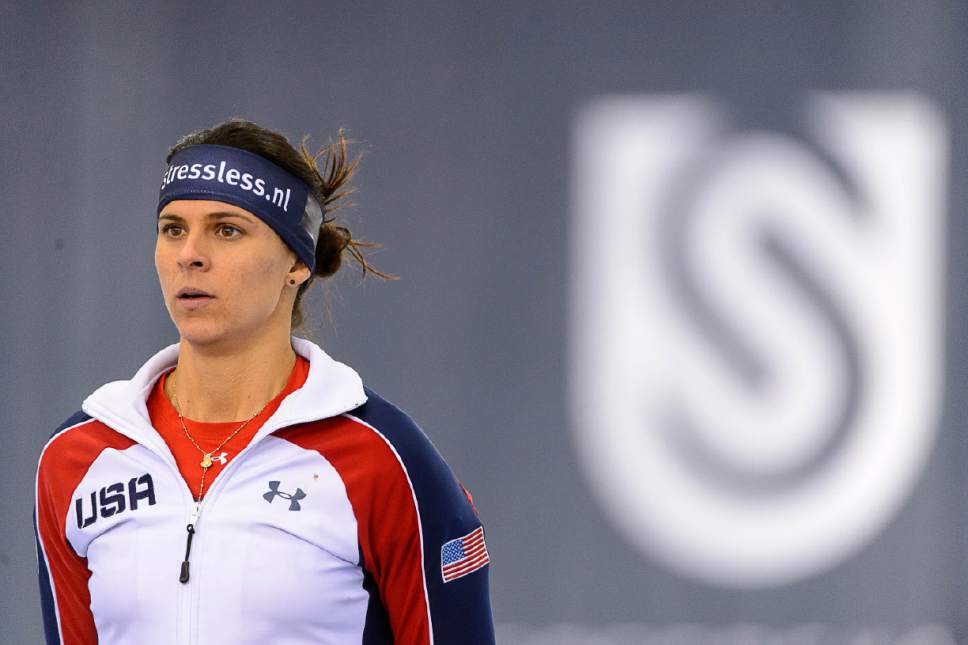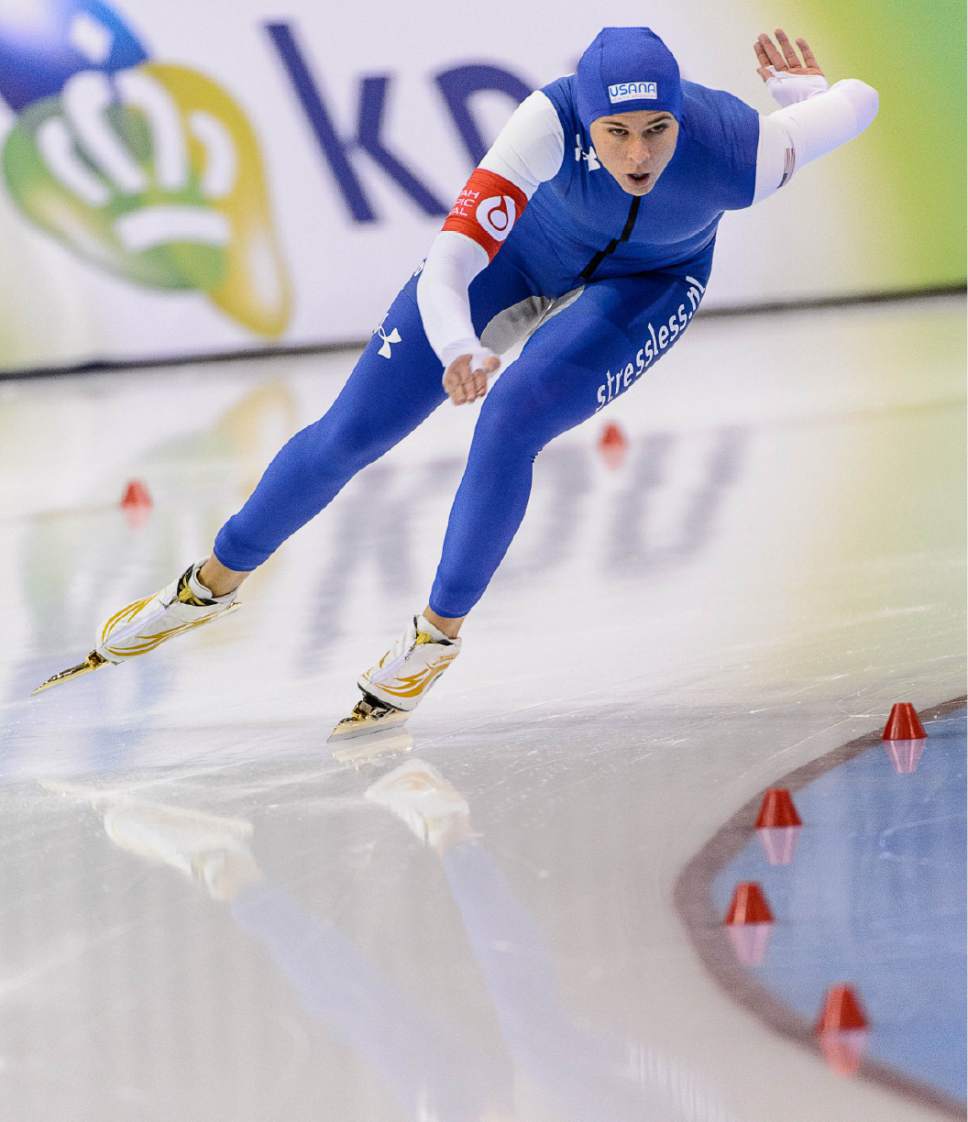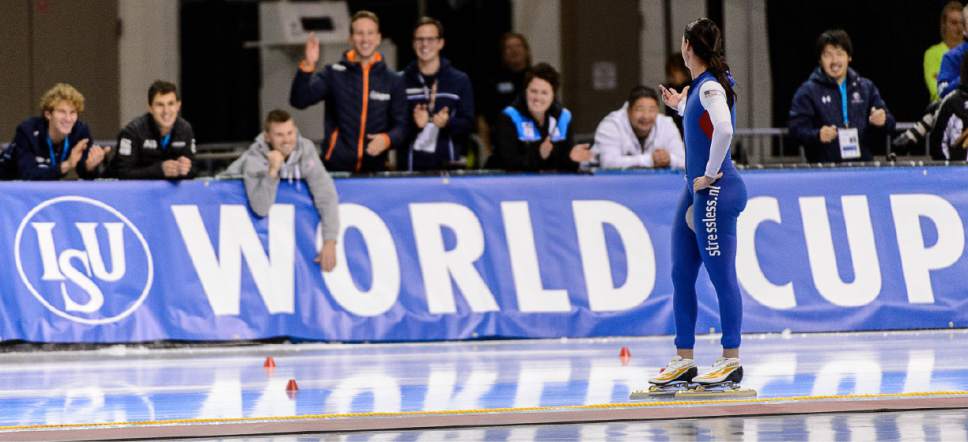This is an archived article that was published on sltrib.com in 2016, and information in the article may be outdated. It is provided only for personal research purposes and may not be reprinted.
Brittany Bowe will slowly glide to the line this weekend for the first time in five months. It will be her first long-track speedskating World Cup race in nearly a year. And in that moment, said one of the world's premier long-track skaters, she guarantees she'll be overcome with "every emotion you can write down."
"But I'm a racer," she said, "so my thoughts are when I get to the start line, it's just going to be like any other race."
That's what Bowe, the 28-year-old Olympian who has 43 ISU World Cup medals to her name, keeps telling herself. But her races in Heerenveen, Netherlands, won't be like any other. Because they will be the first races that — hopefully — leave behind the sudden uncertainty of her blossoming career. Those mornings of waking up unsure if the concussion symptoms will resurface or not. Those days she initially felt good enough to skate around the Utah Olympic Oval in Kearns with a targeted return date on the horizon.
"Frustrating is one way to put it," Bowe said. "Heartbreaking is a better way to put it."
The heartbreak started after Bowe — winner of 20 World Cup medals in 22 starts last season — crashed during a typical training run this past July on her home ice in suburban Salt Lake City. The former Florida Atlantic University point guard, who grew up in-line skating, suffered her first concussion after years of dodging elbows on the court and meetings with the pavement.
"I guess I was blessed to never have had to go through that," she said.
However, the effect has been to thrust her career into uncharted territory.
A few weeks after the concussion, she was cleared to return to skating through various protocols, but setbacks surfaced. She followed proper steps, wound in and out of various stages of recovery, but random, lingering symptoms kept showing up. Midway through her recovery process, Bowe found out her concussion had disrupted her vestibular system — the parts of the inner ear and brain that aid in controlling eye movement and balance.
Balance difficulties don't mix well with a sport that demands cruising as fast as 30-plus miles an hour repeatedly in a circle. So Bowe found herself on a stationary bike, spinning away, as two physical therapists stood in front of her. One to her right, the other to her left. There, her rehabilitation included basic head turns to read what was on cue cards held up by each therapist. She had to recite that number or letter back.
Then came adding numbers. After that was some incorporated ball tossing. The point was to be able to track objects while spinning without feeling the sense of dizziness that continually crept up when she didn't expect it.
"With concussions, we have had someone who needs to spend at least one day in a certain stage, but it's never cut-and-dry," said Shane Domer, sports science director for U.S. Speedskating. "We could be doing the right thing and not get a person through a certain stage for an entire month. It's extremely frustrating."
As noted throughout various concussion studies across several sports, every person responds differently to a brain injury. Each instance presents a "unique response," Domer added.
"If it's a meniscus or ankle or really any other standard medical procedure, you kind of have a timeline and you can hit these timelines, you can see progress, you can see something healing, which is encouraging," Bowe said. "With the brain, you can't really see it. Sometimes you feel good, sometimes you feel bad."
Over the past month, she has been able to find her groove again and get back on track toward the competition and fitness level she had prior to the concussion. But Bowe says she finds herself in a constant state of catch-up this World Cup season after missing the first three stops. Admittedly, it will be odd for a skater who has been so dominant the last few years. All those World Cup golds, World Championship titles and world records serve constant reminders, she said.
Yet just finding her way back to the starting line is a battle Bowe has hopefully, finally won.
"With the injury that I've sustained, with the competitor that I am, the athlete that I am, of course my goal is to be on the podium," Bowe said. "Is it going to happen right away? I'm not sure, but I could tell you that my goal is to be back on top there."
Twitter: @chriskamrani —
The Brittany Bowe file
Age » 28
Sport » Long-track speedskating
Hometown » Ocala, Fla.
Resides » Salt Lake City
Career highlights » 2014 Olympian, two-time world sprint championship overall gold medalist, six-time world single distance championship medalist, 43 career World Cup medals, including 17 gold medals.
Overcoming a concussion » Bowe suffered concussion in training in July and was out of full action the following five months, but returns to skate in the ISU World Cup stop in Heerenveen, Netherlands, this weekend.







